Central SA
Close to 700 carport solar panels light up NWU Vanderbijlpark campus─── 12:45 Thu, 09 May 2024

“The solar panels will also relieve energy challenges brought on by load-shedding.”
The NWU Vanderbijlpark campus has unveiled its new solar carport plant, which consists of 696 solar panels with a capacity of 382 kW.
The plant will help the standby generators by supplementing the emergency power supply during warm weather. Additionally, NWU employees will also have shaded parking because of the solar carport plant.
The project is part of a five-phase installation of solar facilities on all three NWU campuses, aimed at addressing load-shedding challenges and reducing the university’s carbon footprint, said Vanderbijlpark campus deputy vice-chancellor for planning and campus operations, Professor Linda du Plessis.
‘The university will save money by installing these solar panels’
“The solar plant is expected to generate 1500 kWh per day and 505 MWh per year. It will provide green power into the 11 kV network under normal conditions when municipal or grid power is available and assist the standby generators,” said NWU Vanderbijlpark electrical and mechanical technician, Mike Odendaal.
“The university will save money by installing these solar panels, which will also lessen its carbon footprint and improve the environment.”
“The switch to solar power will provide a reliable source of energy during power outages and load shedding. This is particularly important for an institution as we require a stable source of energy to ensure a conducive academic environment,” said Odendaal.

Mike Odendaal, Prof Linda du Plessis, and Collen Makhubela showing off the new solar carport plant. Picture: Vaalweekblad
Vaalweekblad reports the campus spent millions of rands on electricity and diesel for generators during load-shedding last year. Solar energy is becoming increasingly popular due to its efficiency and environmentally friendly nature.
“The campus’ switch to solar power is a step in the right direction towards energy sustainability. This will ensure energy security and help the university become a role model for other institutions to follow,” said Du Plessis.
‘This is a step towards a brighter tomorrow’
Soly South Africa reports there are three main benefits of switching to solar energy for institutions:
• Cost saving. Institutions can save significantly on their electricity costs, freeing up money that can be used to improve facilities.
• Educational opportunities. Installation of solar power systems can serve as useful educational resources for students, giving them practical training.
• Reduced carbon footprint. By limiting their greenhouse gas emissions and dependency on fossil fuels, institutions can contribute to the mitigation of climate change.
“The incorporation of solar power into an institution will contribute to a greener and more sustainable future. This is a step towards a brighter tomorrow where we can all work towards a cleaner and more sustainable world,” said Odendaal.
OFM News mvh














